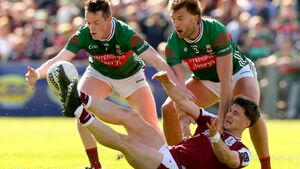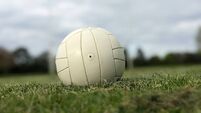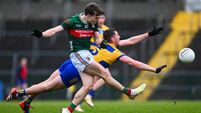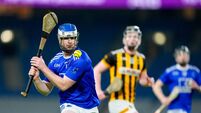Old failings still exist among some positives

Stephen Coen and Aidan O’Shea apply pressure to Cathal Sweeney of Galway during Mayo's two points loss at Hastings Insurance MacHale Park in Castlebar last Sunday. Picture: INPHO/James Crombie
As the clock ticked past the hour mark in Castlebar last Sunday afternoon, Mayo had finally clawed their way back within touching distance, the whiff of a famous Mayo comeback beginning to waft across the MacHale Park pitch. And then, Colm Reape went short.
The Mayo goalkeeper misread the cue and Galway pounced like they’d been waiting for the invitation. Rory Brickenden, left high and dry in no man's land, did what every back must do in such moments of crisis – he pulled his man back and took his medicine. The black card was inevitable. And so was the manner in which Rob Finnerty tapped over the subsequent free. Worse still, Galway won the next kickout and the ball eventually made its way to Paul Conroy who split the posts again.
What had been a chase now became a scramble. Mayo were behind again, but this time they’d have to spend the final ten minutes doing it with fourteen men. This was the defining moment of the day.
When Mayo meet Galway in the Connacht championship, you might as well toss a coin and let chance decide. It doesn’t matter who has the better forwards, the better form or whose three-man weave in the warm-up had the crisper angles and the louder shouts. The winner, more often than not, is decided somewhere in the hidden creases of the day – in a spilled ball, a clumsy tackle, a misjudged bounce. On Sunday afternoon, it was a sloppy kickout For a county of such grandeur and tradition, four years without a provincial title is a drought that would trigger a tribunal in other counties with All-Ireland ambitions. Galway have, of course, been humming nicely these past few years. But this rivalry, at its essence, knows no form guide. It is a stubborn old thing – unpredictable, emotional and repellent to sense. And to their credit, Mayo ripped up the formbook for large periods on Sunday.
The home side won the toss and made the brave – if not baffling – decision to play against a wind strong enough to lift tiles off the houses on MacHale Road. There’s a thin line in the sand between courage and madness, and Mayo didn’t so much toe it as sprint past it like men off to take a dip in the sea on Christmas Day.
Still, the afternoon began promisingly. Two quick scores steadied the nerves, and then came the bolt from the blue: Darren McHale found a gap in the Galway defence, tore through it like a hare in a meadow, latched onto a smart Davitt Neary pass and buried it. It was a goal that felt like a statement at the time.
From there, the tide turned and dragged Mayo under with it. Paul Conroy kicked three two-pointers in the opening 20 minutes – a declaration, perhaps, of how Galway intended to win this game: by reminding Mayo what they’ve long refused to learn. In fact, Galway didn’t attempt a single shot inside the arc until the 23rd minute when Matthew Thompson floated one over.
By then, the visitors were in full control. Six unanswered scores followed Mayo’s sixth-minute goal, capped by a penalty that Matthew Tierney thundered into the net. Galway were hunting now, and the blood in the water was red and green. McHale finally stopped the rot with a score after 34 minutes, Mayo's first since his goal in the seventh minute. But by half-time, there was no sugar-coating the situation – Mayo were eight points down, battered by a breeze they’d willingly chosen to face.
Mayo, needless to say, needed a spark at the beginning of the second-half and it came inside forty seconds. Ryan O’Donoghue reopened affairs with a two-pointer struck clean and true, followed up a couple of minutes later by Mattie Ruane, who straddled the arc and clipped over another. Mayo proved that there are indeed two-pointers within them when they go after them.
Galway, for their part, remained dangerous. They knew the gaps would come, and they kept lurking. But apart from Tierney clipping over a point, their attacking lacked conviction in the third quarter. And Mayo, hunting in packs now, began to close the gap. By the 46th minute, Darren McHale had trimmed it to a single point, and suddenly MacHale Park crackled with tension once again.
Still, Galway always looked more composed shooting into the Bacon Factory End than Mayo did in the first-half. And so, they remained a constant threat. Mayo’s momentum flickered again when Neary chased down a loose ball and tore through the heart of the Galway defence, only to lash his shot over the bar when the net seemed to be at his mercy.
Then came parity; O’Donoghue, positioned somewhere between the 45-metre line and the Moneen Road, took aim and let fly. Connor Gleeson got the faintest of fingertips to the ball, just enough to ensure the Belmullet man came away with a point instead of another two-pointer.
Mayo now had a sniff of the lead but couldn’t quite get their radar working. Chances came and went. Meanwhile, Cillian McDaid began to rise to the occasion and made sure Mayo were given questions to answer. And then came the defining moment and the final ten minute struggle, a mountain Mayo were always going to struggle to summit.
Even then, the moments were there. Enda Hession found himself clean through on goal, only for Gleeson to pull off a save so acrobatic Cirque du Soleil may well come calling this week. And there was still time for one last swing after 70 minutes but the ball caught the outside of Ruane’s boot and curled wide. Galway, for all their efforts, were rewarded with the poisoned chalice of the Group of Death in the All-Ireland group stage draw. And while Mayo are hardly handed a favourable draw in Group A, it certainly seems like a slightly easier route to the tail-end of the season.
If there are positives to be salvaged from the day, it’s that Mayo did make strides. This was, in patches, a step forward from recent weeks. But Mayo remain a team intent on doing things the hard way. If there's a wall they can run through, they’ll find it. And if there isn't, they’ll build it.
Should that pattern continue, they’ll find their summer cut short once again.




